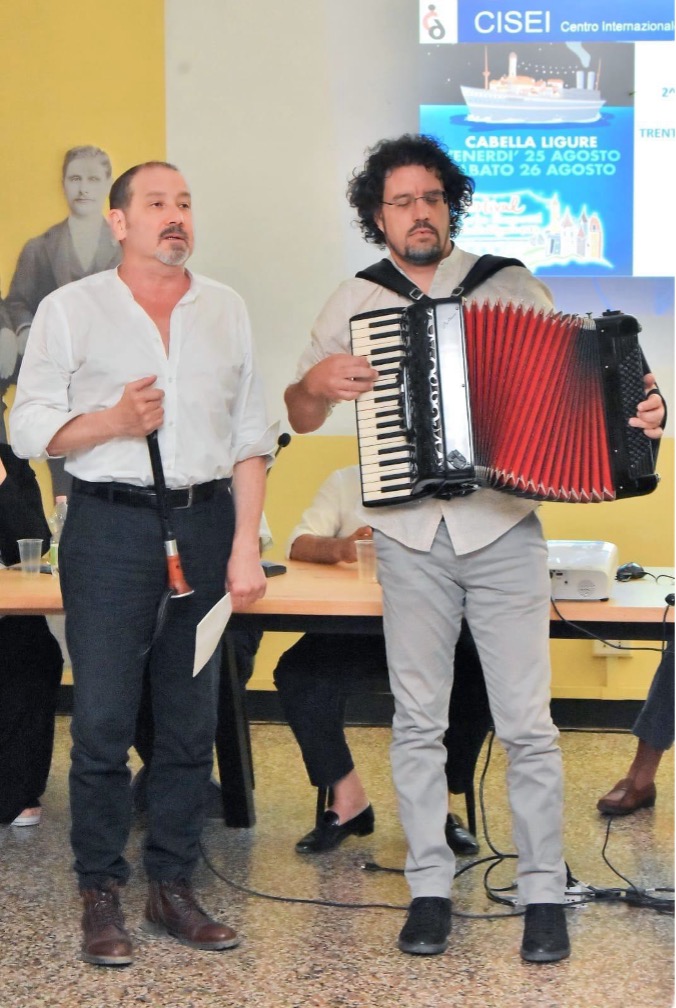Discover
The show “Io parto per la Merica” traces through words, songs and oral testimonies the life stories of our migrants in the period between the end of the nineteenth century and the middle of the twentieth century by the Musa Association.
The Musa Association, traditional music, songs and dances of the Four Provinces, a UNESCO NGO, was founded in 2000 to promote and safeguard the intangible cultural heritage of the territory of the Four Provinces and in particular traditional music centered around an ancient popular oboe (locally called Piffero) which has peculiar peculiarities such as to make it an element of identification of an entire territory. The fife is associated with a vast repertoire of traditional dances which, together with monodic and polyvocal singing, outlines a reality of surprising vitality of traditional culture in a territory characterized by a deep socio-economic crisis. We are in fact in an area where the provinces of Alessandria, Genoa, Piacenza and Pavia are confused. It is a culturally homogeneous territory, called the Four Provinces, characterized by common customs and traditions and an important repertoire of very ancient music and dances. The main musical instrument of this area is the Apennine fife, an ancient popular oboe, of medieval origin which, accompanied by the accordion, and once by the müsa (Apennine bagpipes), guides the dances and animates the village festivals. Until the end of the last century, the fife was accompanied by the Ligurian bagpipes. It was one of the most virtuous fife players, Giacomo Sala di Cegni who, at the beginning of the last century, decided to replace his old companion Musa, with the new and modern accordion, born in Stradella in 1895.
This was a winning idea both from an aesthetic and musical point of view, because thanks to the fusion between the two instruments, the music became even more seductive and began to have an increasing success with the public. It is significant that this musical history has been transmitted through the most virtuoso players. So the parties followed, with the dances that followed the calendar rites, the weddings, the Carnival, with specific repertoires. The fife has always played without interruption. Ernesto Sala di Cegni, who had learned from Giacomo, carried on the tradition and taught new pairs of players, including Stefano Valla and Daniele Scurati and many others. Today there are many young people who have learned to play the fife. Each region has its own specific musical history, with its own repertoire. Here in Italy, between the sea and the plain, this music has been maintained. The passion of our people for dancing has meant that the tradition of the musicians, with their repertoire, has been maintained. A territory characterized by a precarious rural and pastoral economy, like many centers of the Apennines, Cabella Ligure has given rise to intense migratory flows. During the nineteenth century Cabella experienced a progressive depopulation due to a massive transoceanic emigration to Argentina and North America and in the post-war period it suffered the phenomenon of abandonment of the countryside and flight to the city. Once heavily anthropized, this territory offered cultivated land, gently mowed mountains, domestic animals that lived in symbiosis with humans. Today the situation has completely changed, but the beauty and enchantment of these landscapes, the unspoiled nature, the majestic vestiges of the past, combined with a food and wine offer of the highest level and a simple and warm welcome capacity, still exert a considerable attractive force. Thanks to research conducted by historians of emigration
Piedmontese in the world, today we know with certainty that Pope Francis’ maternal grandmother, Maria Gogna, was born in Teo, a small hamlet of the municipality and emigrated to Argentina at an early age.
Days
11 August 24
11 August 24
Timetable
21:00 - 00:00
Information/To know
Suitable for Everybody
Wheelchair accessible
Location/The place
Address
Piazza della Vittoria, 15060 Cabella Ligure AL, Italia
How to get there
By car: Motorway A7 Milan- Genoa - Exit Vignole Borbera Provincial Road 140 Val Borbera To Cabella Ligure By train: Arquata Scrivia Station - Bus service to Cabella Ligure - Autolinee Val Borbera tel.0143/919561.
